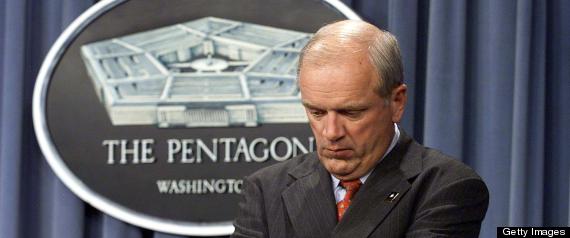KBR Secret Indemnity Agreement Signed By Army Chief Tainted In Enron Scandal
WASHINGTON — The Army official who signed a secret agreement that military contractor KBR claims should burden taxpayers with the bill for the company’s negligent poisoning of U.S. soldiers in Iraq resigned from the military in 2003 after a tenure marked by questions about his ties to Enron Corp.
Thomas E. White, named secretary of the Army in 2001, signed an indemnity agreement protecting KBR, the military’s largest contractor, from legal liability on March 19, 2003. KBR had asked for the agreement as part of its contract to rebuild Iraq oilfields destroyed in the U.S. invasion. White resigned a month later, on April 23, under fire for his previous role as a senior Enron executive and after clashing with former Defense Secretary Donald Rumsfeld over his advocacy for a multi-billion dollar artillery system.
KBR’s indemnity agreement, obtained by The Huffington Post through a Freedom of Information Act request, was classified as secret until Dec. 21, 2012, the month after a federal jury in Oregon decided the company should pay $85 million for negligence that allowed a dozen soldiers to be exposed to a cancer-causing chemical sodium dichromate at the Qarmat Ali water treatment plant in Iraq.
The agreement, never made public until now, is crucial because KBR claims it means taxpayers have to pay both the verdict and the company’s $15 million in legal expenses. The company faces a separate lawsuit filed by national guardsmen from both Indiana and West Virginia, as well as troops from the U.K. The military has said it believes the agreement doesn’t shield KBR from paying for the lawsuits.
It’s not known how many defense contractors have secret indemnification agreements with the government. While most federal agencies are not allowed to enter open-ended indemnification agreements, the Pentagon is exempt under an executive order signed by President Richard Nixon in 1971. An amendment to the 2013 National Defense Authorization Act pushed by Sen. Ron Wyden (D-Ore.) now requires the Pentagon to disclose indemnification clauses that hold military contractors harmless and to justify the agreements to Congress.
White wrote in his 2003 memo granting KBR the indemnity that he “considered the availability, costs and terms of private insurance to cover these risks, as well as the viability of self-insurance, and have concluded that adequate insurance to cover the unusually hazardous risks is not reasonably available.” He said he had no clue how much the indemnity agreement could cost taxpayers.
“It is not possible to determine the actual or estimated cost to the Government as a result of the use of an indemnification clause since the liability of the Government, if any, will depend upon the occurrence of an incident related to the performance of the contract,” White wrote. The agreement was necessary to “facilitate the national defense,” he said.
White, currently a partner at DKRW Energy, did not respond to HuffPost’s request for comment.
White maintained he knew nothing about Enron’s efforts to manipulate energy prices in the California power crisis in 2000 and 2001. His sale of millions of dollars in Enron stock in 2001 came under investigation by federal authorities, but no charges were ever brought. White said he was required to sell his stock under government ethics rules. The Pentagon’s inspector general also investigated whether White and his wife used a military jet for personal travel.
The 2003 agreement between the Army and KBR protects the contractor from financial costs associated with unusually hazardous risks including the “sudden or nonsudden release of hydrocarbons or other toxic or hazardous substances or contaminants into the environment.”
A KBR spokesman previously told HuffPost the company “is confident that it will prevail in enforcing the U.S. government’s legal obligations.” One lawyer representing soldiers in their lawsuit against KBR said the agreement amounted to a “pretty good bailout” for the company.
[docstoc docId=”142445880″ mId=”-10″ width=”630″ height=”55
Short URL: https://kbrlitigation.com/?p=2679


